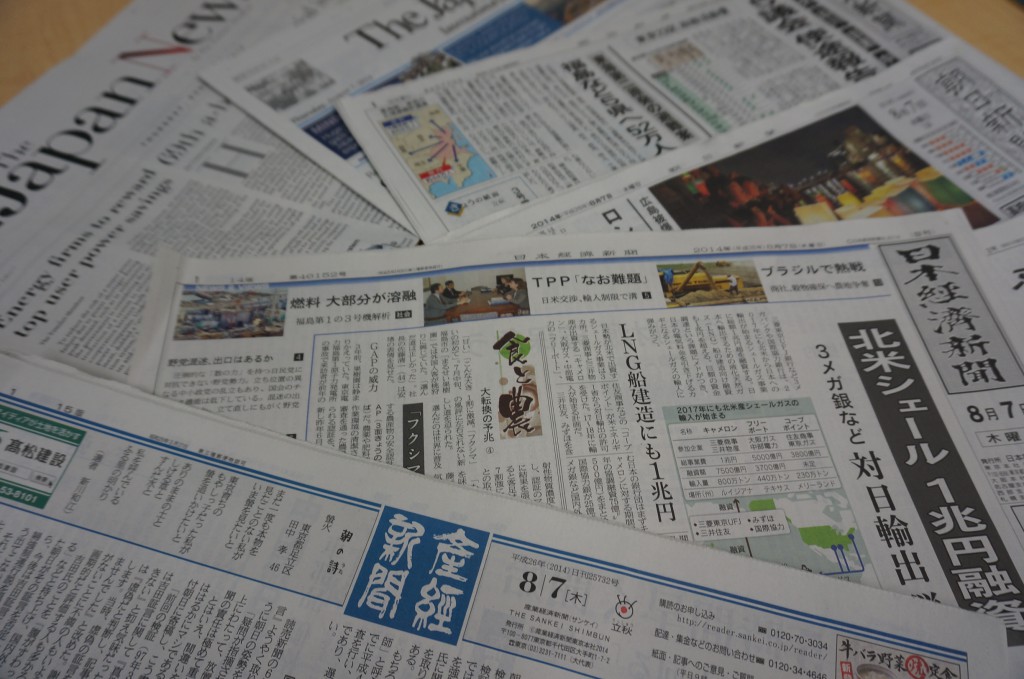A summary of editorials from leading Japanese newspapers (September 12, 2014)
A summary of editorials from leading Japanese newspapers, posted biweekly.
Japan’s Imperial Household Agency has released the annals of Emperor Hirohito (1901-1989), posthumously known as Emperor Showa, that chronicle his life from childhood to his reign in the turbulent Showa era.
It took 24 years for the agency to compile the 12,000-page, 61-volume annals, which contain materials that have thus far not been made public.
The five major national dailies—The Asahi Shimbun, The Mainichi Shimbun, The Nihon Keizai Shimbun (Nikkei), The Sankei Shimbun and The Yomiuri Shimbun— wrote about the annals in their editorials for their Sept. 9 issues.
The Sankei was the only newspaper that wholeheartedly embraced the annals as “objective descriptions” of Emperor Showa’s deeds and words. The four other dailies hailed the release of the annals itself, but addressed problems in the way the agency compiled the documents.
The Sankei and The Asahi widely differ
The Sankei said the annals on the whole give a vivid portrayal of Emperor Showa, who “shared joys and hardships with the Japanese people in pursuit of peace.”
“[The annals] also touch on the issue of abdication right after the war. They described how the emperor asked Interior Minister Koichi Kido if his abdication could prevent Japan from handing over those responsible for the war to the Allied Forces. When the issue of his abdication was talked about just before the International Military Tribunal for the Far East was to hand down rulings, the emperor indicated his intention to fulfill his responsibility without abdicating, according to the annals,” The Sankei said.
The newspaper then highlighted sections on his tours across the nation in 1946-1954 to encourage Japanese people devastated by the war. “The documents described the emperor questioning each person he met about his or her living conditions, which showed he very much cared about how people actually lived.”
The Asahi, on the other hand, was most critical of the annals among the dailies, saying “…the annals are almost completely devoid of direct quotes from Hirohito and simply list events in his life in chronological order.”
“Detailed accounts are provided of his travels and inspection tours around the country. But the Imperial Household Agency’s very cautious stance is readily discernible in sections that deal with the emperor’s words and deeds concerning his war responsibility and prospects of his abdication,” The Asahi said.
The paper went on to add, “The Showa Era teaches the mistakes inherent in the pre-World War II Japanese establishment, where the nation’s non-elected hereditary leader was deified and incorporated in the system of government. We, who are living in a society formed upon the nation’s collective remorse for its past mistakes, must always face the history of the Showa Era squarely and deepen our understanding through earnest discussions.”
Release of more documents urged
The Nikkei and The Mainichi joined The Asahi in questioning the ways the Imperial Household Agency selected materials for the annals as well as its way of writing.
The Nikkei said the original materials the agency referred to vividly described how the emperor remarked, but the annals carry only summaries of what he said. “… in some conspicuous cases, it is difficult to know the source of writing. Some researchers have pointed out the agency deliberately tried to be ambiguous about issues related to the emperor’s war responsibility and abdication.”
The Mainichi said “None of Emperor Showa’s words were blacked out, as opposed to the annals of his father Emperor Taisho. However, some researchers have pointed to the possibility that the editor of the annals of Emperor Showa may have chosen to use non-committal descriptions instead of blacking out any of his words it quotes.”
The Yomiuri generally cast the annals in a favorable light, but said “… in the case of the postwar period, it is worth nothing that Emperor Showa’s words, including those on the enshrinement of Class-A war criminals together with the war dead at Yasukuni Shrine, have not been presented in concrete terms. The agency said it had made ‘judgments on individual cases from a comprehensive perspective.’ This is disappointing.”
All dailies, except The Sankei, urged the agency to disclose more primary materials, including diaries kept by chamberlains and ladies-in-waiting.
*English translations of The Yomiuri, The Asahi, and The Mainichi are from The Japan News, The Asia & Japan Watch and The Mainichi, respectively. Those for The Sankei and The Nikkei are provisional. The content of this page was made by the Foreign Press Center/Japan and does not reflect the opinion of the Japanese Government or any other organization.



